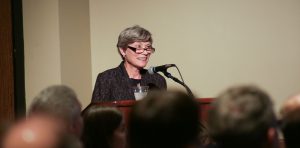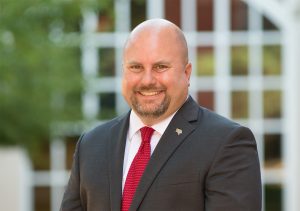A student declares in class that a Black Lives Matter T-shirt is offensive….
A student calls out that class ground rules for conversations silence students of color….
A student says caregivers do not need to help people of a different religion…
Each time, the class looks at the instructor, who now has a choice: Try to keep the peace by ignoring the comment, or engaging in what might be a difficult conversation.
“When these intense conversations erupt in a classroom, our first instinct is to say ‘You can’t say that here,’” said College of Arts and Sciences (CAS) Dean Diane Zosky. “But we’re talking about young 18, 19, and 20-year-olds. This is a teaching moment.”
Instead of dismissing comments that might spark heated dialogue, Zosky and College of Applied Science and Technology (CAST) Dean Todd McLoda are working to equip faculty members with the tools they need to lead tough conversations. “Ignoring comments is the opposite of what we need to do,” said McLoda. “We cannot shut down ideas, even if they are counter to our own beliefs. We need to learn how to address those comments and have meaningful conversations in class.”
McLoda and Zosky spearheaded the development of a new cross-college initiative called Courageous Conversations. The program enlists faculty facilitators to lead interested CAS and CAST instructors through scenarios. “The goal is to help faculty understand what they need to do, or where to turn, when difficult conversations arise,” said McLoda.
The idea for the program stemmed from McLoda’s work on a summer retreat, which focused on diversity, inclusion, and equity. “As the University recruits a more diverse student body, we want to encourage ongoing professional development so that faculty members are prepared to understand our students and the questions that might arise inside and outside the classroom,” he said.
CAS and CAST have 23 departments and schools between the two colleges. Both have worked with the Center for Teaching, Learning, and Technology on areas such as understanding implicit bias and cultural competency. Courageous Conversations is an effort to continue and customize professional development to the needs of departments in CAS and CAST.
It’s about seeing the humanity in one another and bringing those polarizations forward in the classroom. — Diane Zosky
Zosky and McLoda recruited nine faculty members with a history of work in diversity and inclusion to kick off Courageous Conversations. With help from CTLT Director Claire Lamonica, Assistant Professor Brea Banks, and Professor Ani Yazedjian, the faculty members—Karen Stipp, Charles Bell, Chris Gjesfjeld, Gardenia Harris, Aimee Miller-Ott, Tom Gerschick, Tracy Mainieri, Jackie Schneider, and Susan Woollen—pulled together more than 40 possible scenarios that cover issues such as race, gender, religion, and mental health. The nine faculty also agreed to train as facilitators.
Upon the request of department chairs or program leaders, two facilitators run a 60-90 minute session based on the scenarios. “It’s all very organic,” said McLoda. “A group can spend all of their time on one scenario, or cover five or six.” Attendance is voluntary, and faculty members who choose to attend leave the session with take-away points.
Facilitators began running sessions in January, and have already found success, noted McLoda. “People have told us, ‘I never thought about trying it this way,’” he said. “This work is an ongoing journey, and we need to keep encouraging faculty members to stay on the journey.”
Zosky said Courageous Conversations is about more than getting through a challenging class period. “It’s about seeing the humanity in one another and bringing those polarizations forward in the classroom,” she said. “We need to hold a moment when we agree to disagree, but can still be in the space to be respectful to each other.”
Respect and Collaboration are University core values, stated in Educate Connect Elevate: Illinois State—The Strategic Plan for Illinois’ First Public University 2018-2023.



